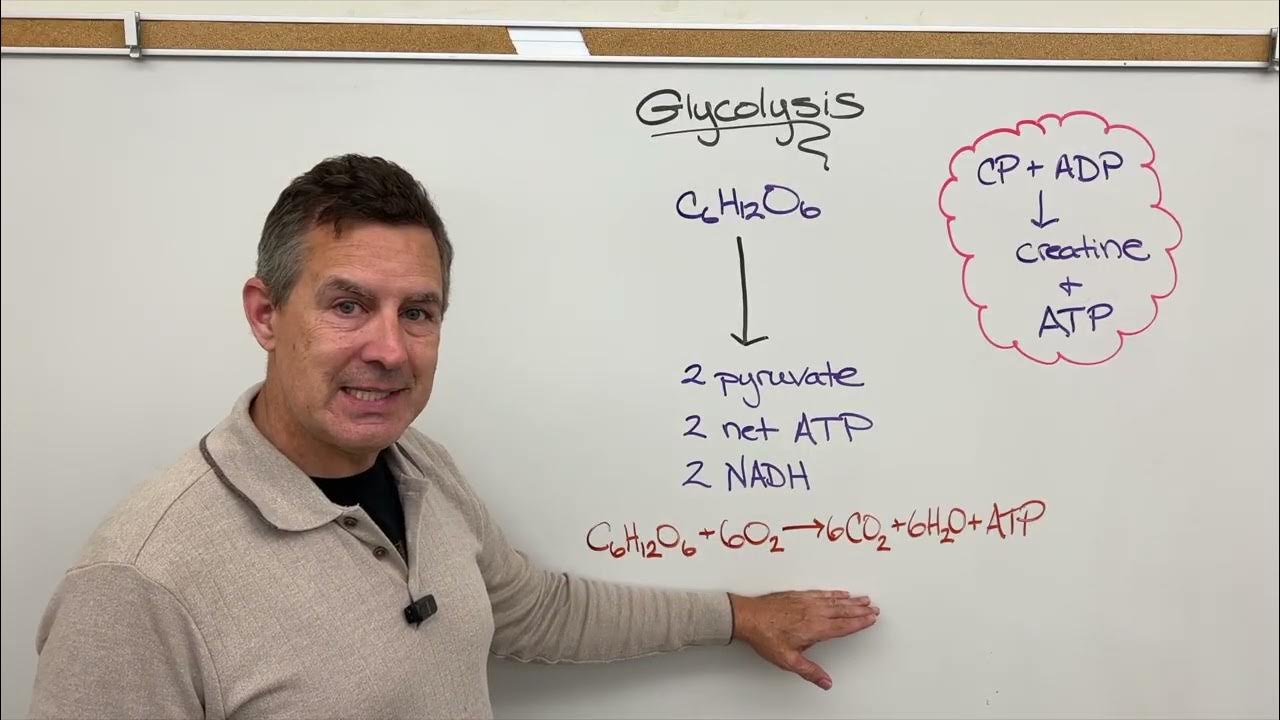DARI GLIKOLISIS SAMPE SIKLUS KREBS LENGKAP | METABOLISME KARBOHIDRAT PART 3
Summary
TLDRThis video provides an insightful overview of carbohydrate metabolism, detailing the essential processes of glycolysis, oxidative phosphorylation, and the Krebs cycle. It explains how glucose is metabolized in both anaerobic and aerobic conditions, highlighting the importance of ATP production for body functions, especially in the brain. The video breaks down the biochemical pathways, emphasizing the formation of key molecules like pyruvate and acetyl-CoA, and concludes with a comprehensive summary of ATP yield, showcasing how the metabolism of glucose can generate up to 38 ATP under optimal conditions. Perfect for those interested in biochemistry!
Takeaways
- 😀 Carbohydrate metabolism consists of three main cycles: glycolysis, oxidative phosphorylation, and the Krebs cycle.
- 🍞 Glycolysis occurs in the cytoplasm and can happen in both aerobic and anaerobic conditions.
- 🔋 In anaerobic glycolysis, only 2 ATP are produced, as pyruvate is converted to lactate.
- 💧 In aerobic glycolysis, pyruvate enters the mitochondria, allowing for greater ATP production.
- ⚗️ Glycolysis starts with glucose phosphorylation, catalyzed by the enzyme hexokinase, requiring 1 ATP.
- 🔄 The Krebs cycle, or citric acid cycle, begins when acetyl-CoA combines with oxaloacetate to form citrate.
- ⏳ The Krebs cycle involves multiple enzymatic reactions, producing NADH, FADH₂, and ATP.
- 🔄 Oxidative phosphorylation consists of three phases: decarboxylation, oxidation of NADH, and addition of coenzyme A.
- 💡 Maximum ATP yield from one glucose molecule can reach 38 ATP through glycolysis, Krebs cycle, and oxidative phosphorylation.
- 🧠 Glucose is the primary energy source for most body tissues, especially the brain, which relies exclusively on glucose and ketone bodies.
Q & A
What are the three main cycles involved in carbohydrate metabolism?
-The three main cycles are glycolysis, oxidative phosphorylation, and the Krebs cycle.
Why is glucose particularly important for the brain?
-The brain can only use glucose and ketone bodies for metabolism, making glucose essential for its function.
Where does glycolysis occur in the cell?
-Glycolysis occurs in the cytoplasm of all cells.
What is the primary difference between anaerobic and aerobic glycolysis?
-Anaerobic glycolysis occurs without oxygen and produces less ATP compared to aerobic glycolysis, which occurs in the presence of oxygen.
What is the initial step of glycolysis, and what enzyme is involved?
-The initial step of glycolysis involves the phosphorylation of glucose to form glucose-6-phosphate, catalyzed by the enzyme hexokinase.
What happens to pyruvate in anaerobic conditions?
-In anaerobic conditions, pyruvate is reduced to lactate, utilizing NADH as the reducing agent.
How many ATP molecules are produced during anaerobic glycolysis?
-Anaerobic glycolysis produces 2 ATP molecules per glucose molecule.
What role does acetyl-CoA play in carbohydrate metabolism?
-Acetyl-CoA is produced from pyruvate and enters the Krebs cycle for further energy production.
What are the products of the Krebs cycle?
-The Krebs cycle produces NADH, FADH2, and ATP, which are used for energy production.
What is the maximum ATP yield from one molecule of glucose through aerobic respiration?
-The maximum ATP yield from one glucose molecule through aerobic respiration can reach up to 38 ATP.
Outlines

This section is available to paid users only. Please upgrade to access this part.
Upgrade NowMindmap

This section is available to paid users only. Please upgrade to access this part.
Upgrade NowKeywords

This section is available to paid users only. Please upgrade to access this part.
Upgrade NowHighlights

This section is available to paid users only. Please upgrade to access this part.
Upgrade NowTranscripts

This section is available to paid users only. Please upgrade to access this part.
Upgrade Now5.0 / 5 (0 votes)





